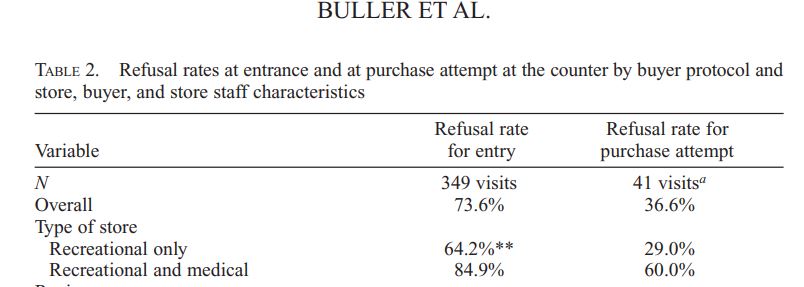Colorado and Washington state both legalized recreational marijuana in 2012 so retailers have had plenty of time to learn the law. To test compliance, between September 2016 and April 2017, 175 recreational cannabis stores in Colorado and Washington State were visited by "pseudo-buyers." Each store in each state was visited twice. and in each visit, an observer entered the store first to scan the store's environment and observe the buyers' purchase behavior. On each of these visits in Washington, a young-adult buyer attempted to enter the store and purchase cannabis without showing a state-approved ID, such as a valid driver's license.
The same protocol was used on the first visit in Colorado, while in a second Colorado visit, an 18-20 year old buyer showed an underage driver's license and attempted to enter the store to purchase cannabis.
The buyers never purchased any marijuana products, as that would be a violating of federal funding rules. If they were allowed to purchase, they simply said they forgot their money and left.

The results showed that while all stores across the two states requested an ID, only 73.6 percent did so at the door and 92.6 percent at the counter though it is legally required during a purchase attempt. Washington State was more likely to sell to kids than Colorado where nearly 14 percent didn't get refused due to being underage.
Refusal did not differ by buyer protocol but both sex and race differed. Hispanics were more likely to be refused than whites while females were less likely than males.
Only 7% of stores even carry a warning for pregnant women
And for legal purchases the signage about risks was lacking. Only 7 percent of stores even had a warning about drug use and pregnancy and fewer than 50 percent even displayed a store license.
Like with alcohol, there may be 'straw purchases' but since the penalties and social stigma of purchasing alcohol for youth are so high, the incidence of youths in recreational states obtaining marijuana may be much higher. Since recreational marijuana is now legal in nine states, it is important that states enforce existing laws to prevent uptake among children.
Citation: Buller, David B., W. Gill Woodall, Robert Saltz, and Mary Klein Buller. "Compliance With Personal ID Regulations by Recreational Marijuana Stores in Two US States." Journal of Studies on Alcohol and Drugs 80, no. 6 (2019): 679-686.





Comments